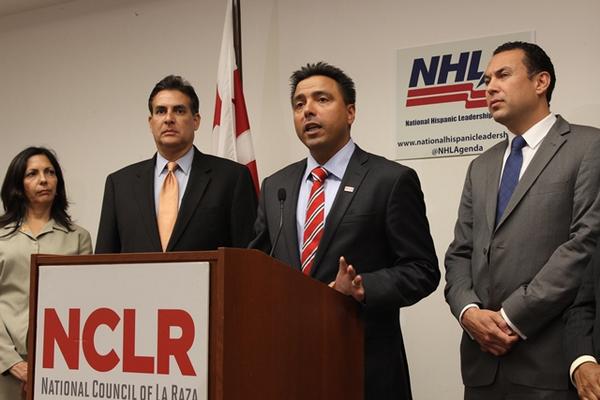"One in Five Latinos Are Behind on their Rental Payments", says UnidosUS expert.
The end of the US eviction moratorium may have a significant impact on Latinos across the country, according to UnidosUS senior vice president Eric Rodriguez.
«Over the last couple of years prior to the pandemic, housing was a major concern for the Latino community in United States, largely because of affordability,» Rodriguez explained in an exclusive interview with LPO.
Rodriguez added that the tendency in the Latino community is to have a «substantial» sum of income going towards rental payments.
Democratic Lawmakers Push to Extend Eviction Moratorium
«It’s something that we continue to work toward, which is greater opportunities for home ownership,» he said. «Prior to the pandemic, there was already pressure around affordable housing and in the places where Latinos tend to be concentrated like California, Texas, Arizona, and Florida, the pandemic made things much worse because of the severe job loss and financial shocks to Latino families and households.»
A report published in September 2020 by UnidosUS examined how the sanitary crisis brought to light the lasting effects of systemic housing discrimination on communities of color. As of July 2020, nearly one in three Latino and Black renters reported that they were behind on their rent payments.
Rodriguez, who oversees the Office of Policy and Advocacy, said, «A lot of Latinas in particular had to leave the workforce because they were taking care of their kids and did not have access to childcare.»
«The pandemic had a huge economic impact on those families and their ability to pay mortgages and rent on a regular basis,» he said.
Since 1968, UnidosUS- formerly known as National Council of La Raza – is committed to being a non-partisan voice for Latinos in the United States. The organization serves millions of Hispanics in the areas of civic engagement, civil rights and immigration, education, workforce and the economy, health, and housing.
Rodriguez is responsible for the UnidosUS federal and state legislative priorities and agenda. He signaled a major problem with the funds allocated by Congress.

«The money has had trouble getting into the hands of households going through the state. A lot of Latino families have very tricky and complicated rental situations, so that money has to flow through the states,» he said. «Right now, it’s a bottleneck because states have had trouble standing up those programs. At some point this is going to come to an end. We cannot continue to extend the moratorium indefinitely. States are going to have to do more to make sure that families and households receive support.»
«If not, those families will get evicted,» he said. «They will be forced out of their homes in a moment when we’re seeing COVID cases going up, which is why these moratoriums came from the CDC. Health authorities are saying [that] we can’t be throwing people out on the street right now.»
The first limited federal protection for renters was passed with the CARES Act in March 2020, but the Centers for Disease Control and Prevention (CDC) issued a more expansive moratorium in September to keep people in their homes.
It was extended multiple times, but the CDC made clear in June that a court order prohibited them from extending it beyond July 31.
«Right now, Democrats in the Congress are scrambling to try and respond and justifiably putting a lot of pressure on the White House to do everything it possibly can leave to leave no stone unturned to make sure that they’re providing and helping these families who may be facing eviction now,» said Rodriguez.
Facing pressure from lawmakers, the Biden administration announced on Tuesday a temporary ban on evictions throughout the country- although it could be unconstitutional.
In June 2021, the Supreme Court allowed the moratorium to remain in place for one final month but held that any further extensions would require congressional approval.
AOC Slams White House Over Eviction Moratorium
Rodriguez agrees that the White House can do more to help struggling families facing eviction, «I think the White House can do more to help states to stand up these programs. Again, a lot of the aid is trapped at the state level.»
«California set up a rental dashboard that shows how the money is coming down from the federal government and it’s just way behind in terms of the need across the state. These are all issues that come with trying to stand up a new program very quickly in this environment,» he said.
«The federal government can provide more assistance and technical assistance to help states advertise and raise public awareness in communities. It needs to be done in multiple languages in places where there’s significant need and public awareness of rental aid is significantly low.»

